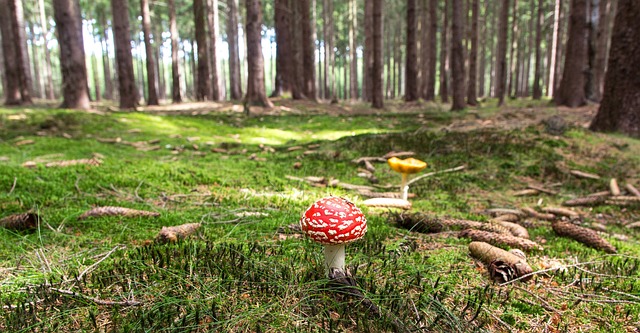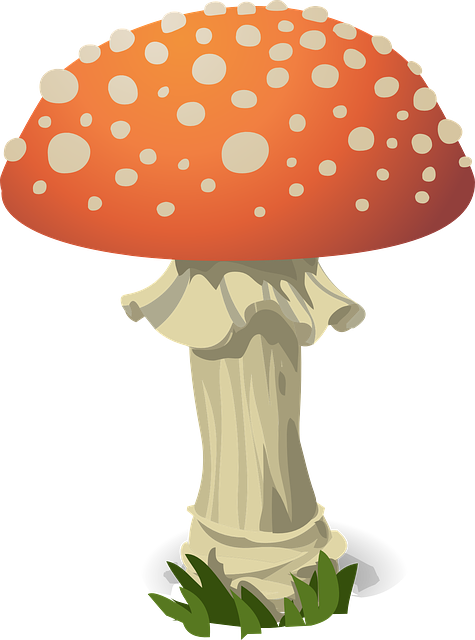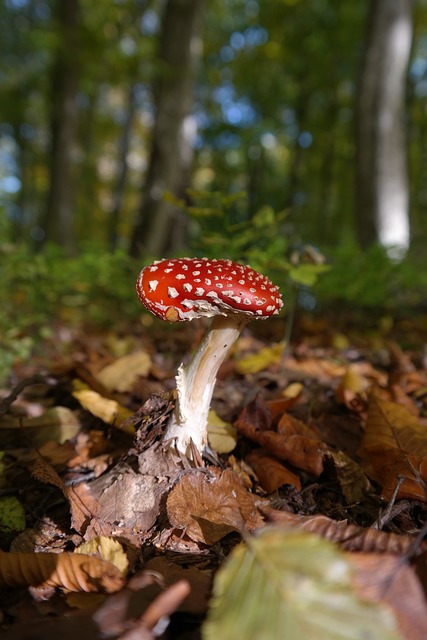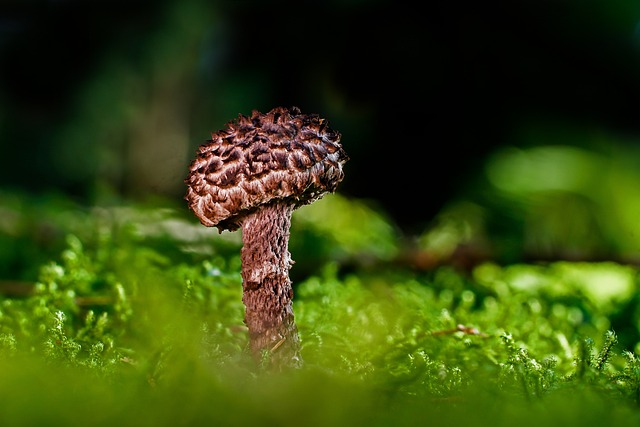Mushroom coffee has become a significant innovation in the health and wellness sector, offering a caffeine-infused beverage with added benefits from adaptogenic fungi like Cordyceps, Reishi, and Lion's Mane. This unique blend delivers a rich, earthy taste that can be enjoyed as a hot coffee substitute or incorporated into various culinary creations, from baked goods to smoothies. It caters to both coffee enthusiasts and those interested in health supplements, promising potential health advantages such as stress management, immune system support, and improved mental clarity and energy levels, which are attributed to the bioactive compounds within these mushrooms. Mushroom coffee alternatives like chaga mushroom tea provide similar benefits with distinct flavors for those seeking variety. This functional beverage is gaining popularity among individuals looking for natural, sustainable energy sources and ways to enhance their well-being as part of a balanced diet, making it a versatile choice for health-conscious consumers.
Embark on a flavorful exploration with the unique, rich taste of mushroom coffee, a beverage that’s reshaping morning rituals worldwide. This article delves into the sensory experience of mushroom coffee, tracing its rise to trend status. Discover a variety of alternatives for those eager to experiment with fungi-infused brews. Learn how to craft your own perfect cup at home and uncover the health benefits backed by scientific research. Additionally, find out which foods and flavors pair best with mushroom coffee to elevate your experience to new heights. Whether you’re a seasoned enthusiast or a curious newcomer, this guide offers a comprehensive look at the world of mushroom coffee alternatives.
- Unveiling the Earthy Richness of Mushroom Coffee: A Sensory Journey
- The Rise of Mushroom Coffee: An Overview of Its Emergence as a Beverage Trend
- Mushroom Coffee Alternatives: Exploring Diverse Ways to Enjoy Fungi-Infused Brews
- Crafting Your Perfect Cup: A Guide to Preparing Mushroom Coffee at Home
- Health Benefits and Mycological Magic: Understanding the Science Behind Mushroom Coffee
- Pairing Perfection: Complementary Foods and Flavors to Enhance Your Mushroom Coffee Experience
Unveiling the Earthy Richness of Mushroom Coffee: A Sensory Journey

Mushroom coffee, a beverage that blends finely ground coffee with extracts from adaptogenic fungi like Cordyceps, Lion’s Mane, and Reishi, offers an earthy richness that is distinct from traditional brews. This unique blend presents a complex flavor profile that invites coffee aficionados to explore beyond the conventional. The taste is a harmonious interplay of the familiar coffee notes with the subtle, yet profound, umami flavors imparted by the mushrooms. For those seeking a caffeine boost without the jittery side effects, or for those intrigued by the potential health benefits of these fungi, mushroom coffee serves as an excellent alternative. Its rich, full-bodied flavor stands on its own, and can also complement various culinary creations, from smoothies to desserts. As a natural source of antioxidants and other beneficial compounds, mushroom coffee not only enhances the sensory experience but may also contribute positively to overall wellness. It’s a testament to the versatility and growing popularity of these adaptogenic mushrooms as alternatives in the health and beverage industries. Whether enjoyed hot or cold, this earthy concoction is a gateway into a world where flavor and well-being coalesce, offering a compelling reason for coffee lovers to expand their palate and consider mushroom coffee as a daily ritual.
The Rise of Mushroom Coffee: An Overview of Its Emergence as a Beverage Trend

Mushroom coffee has surged in popularity as a unique beverage option, offering an intriguing fusion of traditional coffee flavors with the earthy tones of fungi. This emerging trend reflects a broader interest in functional foods and natural alternatives to mainstream consumption habits. The concept of infusing coffee with mushrooms is not entirely new; it has roots in various traditional medicinal practices around the world. However, its recent resurgence is attributed to a growing body of research that highlights the potential health benefits of certain mushroom compounds, such as lion’s mane and chaga, which are believed to support cognitive function and immune health, respectively. These adaptogenic properties make mushroom coffee an appealing alternative for those seeking a healthier twist on their daily brew. The rise of mushroom coffee aligns with contemporary consumer trends that favor sustainable and functional ingredients, as well as products that offer a dual benefit of both taste and wellness. As the market for natural and health-conscious beverages continues to expand, mushroom coffee stands out as a significant player, offering a rich, flavorful, and invigorating experience that caters to an increasingly health-aware demographic.
Mushroom Coffee Alternatives: Exploring Diverse Ways to Enjoy Fungi-Infused Brews

Mushroom coffee has been gaining popularity for its unique flavor profile and potential health benefits, often derived from adaptogenic fungi like Cordyceps, Reishi, and Lion’s Mane. While the earthy richness of this brew is a draw for many, those looking to explore different tastes or seeking alternative ways to incorporate these beneficial fungi into their diet can find solace in the myriad mushroom coffee alternatives available. For instance, mushroom tea or “mushroom elixirs” offer a caffeine-free option that still delivers the medicinal properties of mushrooms, often with added flavors like berry or citrus for a more palatable experience. Another alternative is mushroom coffee powders infused with other adaptogens such as ashwagandha or rhodiola, which can provide a synergistic effect and cater to different wellness goals. Additionally, there are mushroom-infused hot chocolates and lattes that combine the health benefits of fungi with the comforting taste of cocoa, available in various sweeteners and milk alternatives to suit diverse dietary preferences. For those adventurous enough to experiment further, mushroom coffee can be incorporated into baked goods like muffins or cookies, or even blended into smoothies for a nutrient-packed start to the day. These alternatives not only expand the culinary uses of mushroom coffee but also make it accessible and appealing to a wide range of tastes and dietary requirements.
Crafting Your Perfect Cup: A Guide to Preparing Mushroom Coffee at Home

Mushroom coffee has emerged as a unique and health-conscious beverage option, offering an earthy rich flavor that stands out from traditional brews. To craft your perfect cup at home, there are several steps to follow that will ensure you maximize both the taste and potential wellness benefits. Begin by selecting your preferred type of mushroom coffee blend; options abound from smooth to robust in flavor, catering to a variety of palates. Coffee aficionados looking for alternatives to their daily caffeine fix will appreciate the subtle yet distinct taste that mushroom coffee brings to the table.
Once you’ve chosen your blend, the preparation process is straightforward and similar to making a regular cup of coffee. Start by grinding your mushroom coffee beans if they are not already ground; freshness can significantly impact both flavor and aroma. Use a medium-coarse grind for optimal extraction when using a drip brewer or pour-over method. If you prefer French press or espresso, a finer grind will be more suitable. Measure out one to two tablespoons of ground mushroom coffee per six ounces of water, depending on your taste preferences and the strength of the coffee. Heat your water to just before boiling—typically around 195°F to 205°F (90°C to 96°C)—to extract the full flavor profile. After brewing, customize your cup with your choice of sweeteners or milk alternatives if desired, such as oat, almond, or coconut milk, aligning with a health-oriented lifestyle that many mushroom coffee enthusiasts embrace.
Health Benefits and Mycological Magic: Understanding the Science Behind Mushroom Coffee

Mushroom coffee, a beverage that blends finely ground coffee with extracts from adaptogenic fungi, has garnered attention in wellness circles for its unique flavor profile and potential health benefits. This innovative brew offers an earthy, rich taste that coffee aficionados and health enthusiasts can savor as an alternative to traditional coffee. The mushrooms used, such as Cordyceps, Reishi, and Lion’s Mane, are not just any fungi; they are specially selected for their adaptogenic properties, which help the body manage stress, support immune function, and promote overall well-being. These mycological ingredients are steeped in a blend to enhance mental clarity, energy levels, and even athletic performance, making mushroom coffee a potent alternative to the morning cup of joe for those seeking a health-forward lifestyle.
The science behind mushroom coffee is rooted in the bioactive compounds found in these fungi. These compounds have been studied for their various benefits, which include anti-inflammatory and antioxidant effects. For instance, Cordyceps has been associated with improved oxygen utilization and endurance in athletes, while Reishi is known for its calming and immune-boosting properties. Lion’s Mane, on the other hand, is celebrated for its potential neurogenic effects, which may aid cognitive function and nerve regeneration. When consumed as part of a balanced diet, mushroom coffee provides a unique synergy of caffeine from the coffee and the distinct nutritional compounds from the mushrooms, offering a compelling alternative to the standard coffee market that is gaining traction among health-conscious individuals looking for sustainable energy sources and natural ways to enhance their daily routines.
Pairing Perfection: Complementary Foods and Flavors to Enhance Your Mushroom Coffee Experience

Mushroom coffee, a beverage that blends finely ground coffee with extracts from adaptogenic fungi like Cordyceps, Reishi, and Lion’s Mane, offers an earthy rich flavor that can be elevated through careful pairing. To fully savor the unique taste profile of mushroom coffee, consider complementary foods and flavors that accentuate its nuances. For instance, a slice of banana bread with a hint of cinnamon can bring out the roasted notes in the coffee while the subtle sweetness complements the coffee’s natural earthiness. Alternatively, a piece of dark chocolate with a high cocoa content can harmonize with the complex flavors of the mushroom blend, providing a symphony of taste that is both indulgent and invigorating. For those seeking mushroom coffee alternatives, a chaga mushroom tea might serve as a warming companion to your morning routine, offering a similar adaptogenic experience but with its own distinct flavor. Incorporating foods rich in umami, like a soft-boiled egg or a small serving of miso soup, can also enhance the savory depth of your mushroom coffee, creating a well-rounded and satisfying sensory experience. These pairings not only complement the flavors but also offer additional health benefits, making mushroom coffee a versatile and wholesome addition to your diet.
Mushroom coffee has carved out its unique niche in the beverage landscape, offering an earthy rich flavor that appeals to a diverse array of palates. Its emergence as a trend reflects a growing curiosity and openness to experiment with new flavors and health-promoting alternatives. Whether you’re a long-time enthusiast or a curious newcomer, there are numerous ways to savor mushroom coffee, from traditional brews to innovative infusions that expand the fungi-infused beverage experience. With a wealth of alternatives to explore, each sip invites you to craft your perfect cup at home, tailored to your individual taste preferences. As we’ve journeyed through the sensory exploration, scientific understanding, and culinary pairings, it’s clear that mushroom coffee is more than just a beverage trend; it’s a versatile and health-conscious choice for those seeking a rich, robust flavor in their daily routine.
